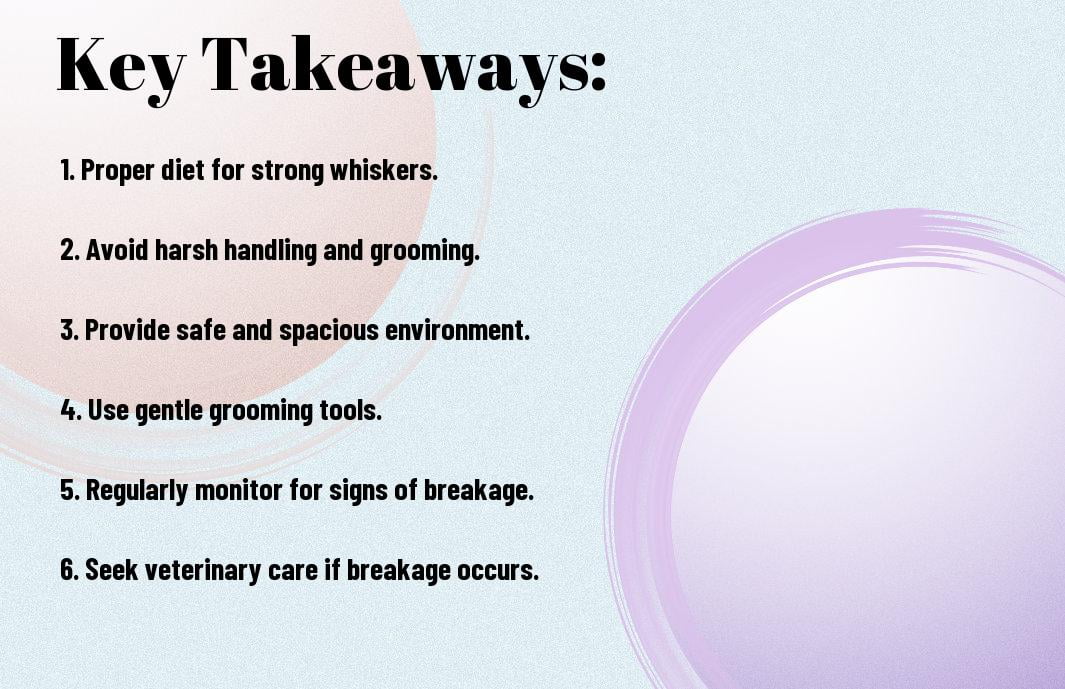How To Prevent And Treat Whisker Breakage In Chinchillas?
Greetings, chinchilla owners! Are you concerned about the potential dangers of whisker breakage in your furry friend? You’ve come to the right place. It’s crucial to understand the importance of your chinchilla’s whiskers and the potential risks associated with breakage. In this informative blog post, you’ll learn how to prevent whisker breakage and treat any existing issues to ensure the health and well-being of your beloved pet. Let’s dive in and take the necessary steps to keep your chinchilla happy and healthy.
We are supported by our audience. When you purchase through links on our site, we may earn an affiliate commission, at no extra cost for you. Learn more. Last update on 26th July 2024 / Images from Amazon Product Advertising API.

Causes of Whisker Breakage in Chinchillas
Some chinchilla owners have reported whiskers getting damaged and have sought advice on how to prevent and treat it. Whisker breakage in chinchillas can be caused by various factors, including physical and environmental reasons.
Physical Causes of Whisker Breakage
One of the physical causes of whisker breakage in chinchillas can be rough handling. When you handle your chinchilla, be gentle and avoid pulling or tugging on their whiskers. Additionally, chinchillas can accidentally break their whiskers if they get them caught in something around their cage. Ensuring that their cage is free of any sharp edges or potential hazards can help prevent whisker breakage.
Environmental Causes of Whisker Breakage
Environmental factors can also contribute to whisker breakage in chinchillas. If your chinchilla’s cage is not spacious enough, they may accidentally bump their whiskers against the cage bars, leading to breakage. Similarly, if the bedding in their cage is too coarse or rough, it can also cause damage to their whiskers. Make sure to provide a comfortable and safe environment for your chinchilla to minimize the risk of whisker breakage.
Prevention of Whisker Breakage in Chinchillas
Clearly, preventing whisker breakage in chinchillas is crucial for their overall well-being. As a chinchilla owner, it’s important to be aware of the potential causes and ways to minimize the risk of whisker breakage. To gain a better understanding of chinchilla health issues, you can refer to the Health Issues D – H section of ForeverFeistyChinchilla.org.
Proper Chinchilla Care for Whisker Health
Proper chinchilla care plays a significant role in maintaining the health of their whiskers. Ensuring that your chinchilla has a well-balanced diet, appropriate grooming, and regular health check-ups can contribute to strong and resilient whiskers. Additionally, handling your chinchilla gently and providing a stress-free environment can also have a positive impact on their whisker health.
Safe Environment Creation to Prevent Whisker Breakage
Creating a safe and secure environment for your chinchilla is essential in preventing whisker breakage. You can achieve this by carefully selecting their cage or enclosure, ensuring that it is spacious, free of any potential hazards, and equipped with suitable accessories. Additionally, providing adequate bedding and nesting material can help prevent accidental breakage of your chinchilla’s whiskers.
Dietary Methods for Healthy Chinchilla Whiskers
It’s essential to pay attention to your chinchilla’s diet as it directly impacts the health of their whiskers. Providing a diet rich in high-quality hay, fresh water, and specially formulated chinchilla pellets is vital for maintaining strong and resilient whiskers. Avoid feeding your chinchilla sugary or fatty treats, as they can negatively affect the overall health of their whiskers.
Treatment for Whisker Breakage in Chinchillas
Now that you have identified and understood the causes of whisker breakage in your chinchilla, it’s time to look into the treatment options. Remember, if you are ever in doubt about the health of your chinchilla, it is always best to consult with a professional. For comprehensive information on chinchilla health, you can visit Wellsboro Veterinary Hospital – Health.
Professional Veterinary Treatment for Whisker Breakage
If you notice that your chinchilla is experiencing frequent or severe whisker breakage, it is crucial to seek professional veterinary care. A veterinarian who has experience with chinchillas can assess the overall health of your pet and provide targeted treatment. They may recommend dietary changes, supplements, or other interventions to address the underlying cause of the whisker breakage. Seeking professional help is essential to prevent further complications and ensure the well-being of your chinchilla.
Home Care and Treatment for Whisker Breakage
While professional veterinary care is essential, there are also some measures you can take at home to help prevent and treat whisker breakage in your chinchilla. Ensuring that your chinchilla has a balanced diet, with adequate nutrients and roughage, can support overall health, including whisker strength. Additionally, providing enriching toys and activities can reduce stress and prevent excessive grooming, which can lead to whisker breakage. Regular grooming and gentle handling can also help minimize the risk of whisker breakage. Remember to always monitor your chinchilla’s behavior and appearance, and seek professional help if you notice any concerning signs.
To Wrap Up
By following the preventative measures outlined in this guide, you can help keep your chinchilla’s whiskers healthy and prevent breakage. Additionally, if you notice any signs of whisker breakage, be sure to consult with a veterinarian to determine the underlying cause and appropriate treatment. Taking proactive steps to ensure the health of your chinchilla’s whiskers will contribute to their overall well-being and quality of life.